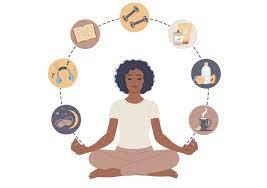Self care is more than just a trend or a luxury—it’s a vital practice for maintaining mental, emotional, and physical health. In today’s fast-paced world, people often prioritize work, family, or social obligations over their own well-being. This can lead to burnout, stress, and long-term health issues. Science shows that taking time to care for yourself is not selfish; it’s necessary for living a balanced, productive, and fulfilling life. Understanding why self-care matters and how to practice it effectively can make a big difference in overall wellness.
Why Self-Care Matters
For many people, self-care might feel like an indulgence. However, research shows that neglecting your own needs can negatively affect mood, focus, and even immunity. Caring for yourself ensures that you can function better in all areas of life. It helps manage stress, prevents burnout, and contributes to long-term health.
The Connection Between Mind and Body
Self-care isn’t just about relaxation; it impacts physical health as well. Stress hormones like cortisol can increase when you’re overworked or emotionally drained, which affects sleep, digestion, and even heart health. Activities that promote relaxation—like meditation, light exercise, or spending time outdoors—can reduce these harmful effects.
Mental Health Benefits
Engaging in regular self-care improves mood, focus, and resilience. Simple practices like journaling, taking breaks, or engaging in hobbies provide mental space to recharge. Over time, these habits help reduce anxiety and depression symptoms.
Physical Health Benefits
Self-care also supports physical wellness. Exercise, proper nutrition, and adequate sleep help maintain energy levels, strengthen the immune system, and improve overall health. Even short periods of rest and recovery have measurable benefits.
Stress Reduction Through Self-Care
Stress is one of the leading causes of health problems today. Practicing self-care provides a buffer against daily stressors. By setting aside time for activities that recharge you, your body can recover from the negative effects of stress more efficiently.
Sleep as Self-Care
Sleep is a critical part of self-care. Poor sleep impacts cognitive function, emotional regulation, and physical health. Prioritizing sleep—by keeping a consistent schedule and creating a calming bedtime routine—is one of the most effective self-care habits.
Mindfulness and Meditation
Mindfulness exercises and meditation help regulate emotions and reduce anxiety. Spending even a few minutes a day focusing on your breath or observing thoughts without judgment can enhance overall well-being.
Emotional Self-Care
Emotional self-care involves recognizing your feelings, setting boundaries, and engaging in activities that nurture your mental state. Talking to friends, seeking therapy, or taking breaks from stressful situations all contribute to emotional wellness.
Setting Boundaries
Saying no when necessary and creating space for yourself is a key part of self-care. Boundaries help prevent burnout and ensure that your energy is spent on things that truly matter.
Engaging in Hobbies
Hobbies and creative outlets give your mind a break from work or obligations. Whether it’s painting, reading, gardening, or playing music, engaging in enjoyable activities helps recharge your emotional batteries.
Physical Self-Care
Physical self-care is about maintaining your body’s health and energy. This includes nutrition, exercise, hygiene, and medical checkups. Taking care of your body supports mental and emotional well-being as well.
Nutrition and Hydration
Eating balanced meals and staying hydrated is a form of self-respect. Proper nutrition fuels energy levels and supports brain function, which in turn affects mood and productivity.
Exercise
Regular physical activity releases endorphins, reduces stress, and improves overall fitness. Exercise doesn’t need to be intense; walking, yoga, or light stretching can provide significant benefits.
Routine Health Checks
Scheduling regular health checkups is another essential aspect of physical self-care. Preventive care helps detect issues early and maintains long-term health.
Social Self-Care
Humans are social beings, and nurturing relationships is part of self-care. Positive social interactions provide emotional support and reduce feelings of isolation.
Spending Time with Loved Ones
Connecting with friends and family offers comfort, joy, and a sense of belonging. Even brief interactions can boost mood and resilience.
Building Support Networks
Having a support system, whether through friends, colleagues, or community groups, provides stability during challenging times. Support networks encourage healthier coping strategies and offer perspective.
The Science Behind Self-Care
Research supports the idea that self-care improves health outcomes. Studies show that people who engage in regular self-care have lower stress levels, better cardiovascular health, and more robust immune responses. Self-care also improves cognitive function, memory, and emotional regulation.
Brain Chemistry
Self-care activities like exercise, meditation, and hobbies stimulate dopamine and serotonin production. These neurotransmitters enhance mood, motivation, and overall mental well-being.
Hormonal Balance
Reducing stress through self-care lowers cortisol levels. Chronic high cortisol can contribute to weight gain, fatigue, and weakened immunity. By caring for yourself, you help maintain hormonal balance.
Creating a Self-Care Routine
A self-care routine doesn’t need to be complicated. The key is consistency and variety. Incorporate practices that address mental, emotional, physical, and social needs.
Morning Practices
Starting the day with small self-care rituals, such as stretching, meditation, or a healthy breakfast, sets a positive tone.
Midday Breaks
Taking short breaks during work helps maintain focus and reduce fatigue. Even five minutes of deep breathing or a brief walk can reset your energy.
Evening Wind-Down
Creating a calming evening routine supports sleep and emotional recovery. Activities like journaling, reading, or taking a bath prepare your body and mind for rest.
Overcoming Barriers to Self-Care
Many people struggle to prioritize self-care. Common obstacles include busy schedules, guilt, and misunderstanding its importance.
Time Management
Scheduling self-care like any other appointment ensures it becomes part of your routine. Even brief, consistent practices are effective.
Dealing with Guilt
Self-care is not selfish. Remind yourself that taking care of your well-being benefits not just you but also those around you by allowing you to be more present and engaged.
Tailoring Self-Care to You
Not every activity works for everyone. Experiment with different practices to find what truly recharges you and fits your lifestyle.
Self-Care in the Digital Age
Technology offers both challenges and opportunities for self-care. Smartphones and social media can increase stress, but they also provide tools for mindfulness, tracking habits, and connecting with supportive communities.
Limiting Screen Time
Reducing unnecessary screen time, especially before bed, improves sleep and mental clarity.
Using Apps for Support
Mindfulness and wellness apps can guide meditation, track exercise, and encourage daily self-care practices.
FAQs
How much time should I dedicate to self-care daily?
Even short daily practices of 15–30 minutes can make a significant difference. Consistency matters more than duration.
Is self-care only about relaxation?
No. Self-care includes mental, emotional, physical, and social practices, not just relaxation.
Can self-care improve work performance?
Yes. Regular self-care reduces stress, increases focus, and boosts productivity.
What if I feel guilty taking time for myself?
Self-care is necessary, not selfish. Prioritizing your well-being allows you to be more present and effective in other areas of life.
Are there quick self-care practices for busy schedules?
Yes. Simple activities like deep breathing, a short walk, stretching, or journaling can fit into even the busiest days.
Conclusion
Self-care is not optional; it’s essential for a healthy, balanced life. By incorporating practices that support mental, emotional, physical, and social well-being, you can reduce stress, prevent burnout, and improve overall health. Science supports the benefits of self-care, showing that it affects brain chemistry, hormonal balance, and long-term wellness. Creating consistent routines, tailoring practices to your needs, and overcoming common barriers ensures that self-care becomes a sustainable habit rather than a fleeting trend. Taking time for yourself isn’t selfish—it’s the foundation for living a fuller, healthier, and more resilient life.



